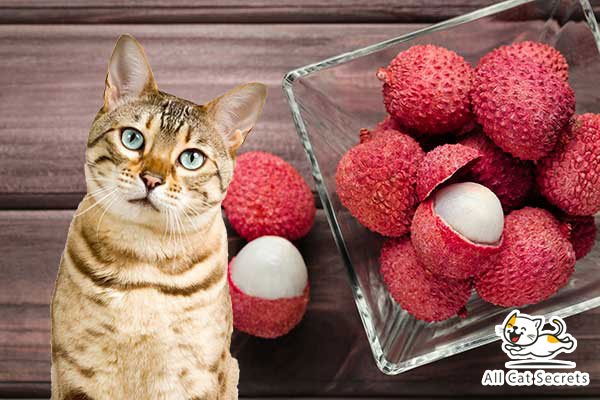Most fruits and vegetables have no place in a cat’s diet. That’s for the simple reason that cats are obligate carnivores.
Like his wild cousins, such as lions and cheetahs, the domestic cat can thrive exclusively on a diet of animal protein. However, that doesn’t imply your cat will drop dead if he ever snacked on plant-based products.
If you’ve owned a cat long enough, you must have caught him multiple times nibbling on grass blades in your backyard. Grass and other plants may help to relieve indigestion while also clearing furballs from your kitto’s stomach.
Now that cats can safely eat some plant-based foods, where does that leave lychees? Can cats eat lychee?
Yes, cats can definitely eat lychee. Lychee isn’t known to contain toxins that could become immediately problematic to cats. In fact, these fruits are loaded with many essential nutrients that cats may benefit from, including dietary fiber, minerals, water, and vitamins. What’s more, lychees are low in fat. So, you won’t have to worry about your feline friend packing up more weight from snacking on these fruits.
That said, lychees are only beneficial to cats if served in moderation. As with any plant-derived food product, lychee should never be fed to cats in excess.
This post uncovers everything there is to know about cats and lychees, including the benefits and potential side effects of these fruits for your kitto.
Table of Contents
More About Lychees
As a responsible cat owner who also loves lychees, you’ll occasionally find yourself wondering, ‘is it okay that my cat eats lychee?’
As we’ve just indicated, cats can eat lychees. Not only are these fruits safe. They also pack numerous essential minerals that your cat could benefit from.
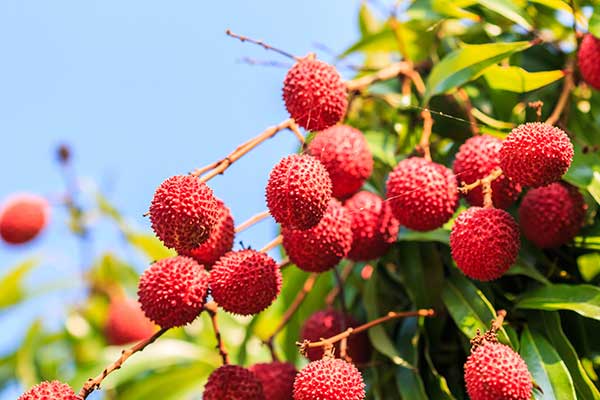
But before we highlight the possible health benefits and adverse effects of lychees for cats, it would be best to first understand exactly what these fruits are.
Now, lychee is a small, pink-red tropical fruit from the soapberry family, noted for its sweet and flowery flavor. The fruit goes by numerous other names, including lichee, litchi, rambutan, and longman.
Lychee is native to China and the larger Southeast Asian region. But due to its immense dietary and health benefits, the fruit is now cultivated in various regions worldwide, particularly in subtropical climates.
Lychees are typically eaten fresh, usually after peeling off their leathery skin. The fruit may also be used as an ice cream flavor or processed into juice, jelly, wine, or sherbert. Whichever form it’s consumed, lychee is a source of essential minerals, vitamins, and even antioxidants.
Now that you’re well-acquainted with what lychees are, it’s now time to delve deeper into our original question – can cats eat lychee fruit? The following section shall expound more on that.
- ✅ Food supplement for everyday use. Supports cell protection and strengthens your cat’s adaptive immune system with important...
- ✅ Organically bound trace elements zinc, manganese and selenium. DL-methionine for a well-balanced metabolism, taurine for...
- ✅ Supports cats of every age, older cats and kitten. Long-term or short-term treatment for skin and fur troubles like hair loss,...
Last update on 2024-07-23 / Affiliate links / Images from Amazon Product Advertising API
Health Benefits of Lychees for Cats
A 100-gram (3.5-ounce) serving of fresh lychees boast the following nutritional profile;
- Calories – 66
- Protein – 0.8 grams
- Carbohydrates – 16.5 grams (NB: Much of the carbs in lychees comes from sugar, which is at 15.2 grams)
- Fat – 0.4 grams
- Fiber – 1.3 grams
- Water – 81 grams
Besides the above nutrients, the same serving of lychees also provides a decent supply of essential vitamins and minerals.
Examples include vitamins A and C, copper, magnesium, phosphorus, potassium, and calcium. The fruit is also high in antioxidants, including carotenoids and flavonoids.
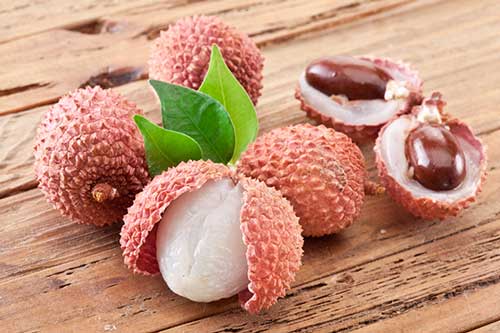
The following are the specific ways your cat could benefit from snacking on lychees;
1. Improved Digestion
Lychees are relatively high in dietary fiber. Fiber is noted for its ability to aid digestion.
Dietary fiber exists in two main forms, with each playing a distinctive role in improving overall digestion. They include soluble and insoluble fiber.
Soluble fiber is readily absorbed into the body, where it nourishes your cat’s gut microbiota. Gut microbiota are the gut-friendly microorganisms that line an animal’s alimentary canal. Diets rich in soluble fiber may help to keep certain digestive and metabolic disorders at bay, including inflammatory bowel disease (IBD).
On the other hand, insoluble fiber moves through a cat’s stomach undigested. In the process, it bulks up the animal’s stool, thereby improving stool consistency and ensuring regular bowel movements. Therefore, supplementing your cat’s diet with lychees might help to ease constipation and boost the animal’s bowel activity.
- Natural prebiotic fiber, sourced from chicory root, helps promote digestive health
- High protein formula with real chicken as the first ingredient
- Fortified with live probiotics to support digestive and immune health
Last update on 2024-07-23 / Affiliate links / Images from Amazon Product Advertising API
2. Rehydration
Cats have a notorious reputation for being picky eaters (and drinkers). Unlike most pets who’ll generally refuse to drink water when sick, cats could easily lose interest in water even when they’re in perfect shape.
If your kitto doesn’t drink water well enough, it will only be a matter of time before the animal comes down with dehydration.
Dehydration could trigger other complications, including seizures, headaches, involuntary muscle movements, and constipation.
One way to keep your cat rehydrated is by feeding him moisture-rich foods like lychees. Fresh lychees boast up to 80% water. So, the fruit may help avert dehydration for cats who don’t seem to drink enough water than they should.
3. Weight Management
The high water and fiber content in lychees could work synergistically to keep your cat’s weight in check. Fiber- and moisture-rich foods are famous for their ability to induce a feeling of fullness faster and for longer.
Therefore, lychees may go a long way in reducing the food portions that your feline friend can down in one sitting. Besides, the cat will remain full much longer than usual. That combination is useful in preventing hunger pangs and food cravings, which are the leading causes of undesired weight gain.
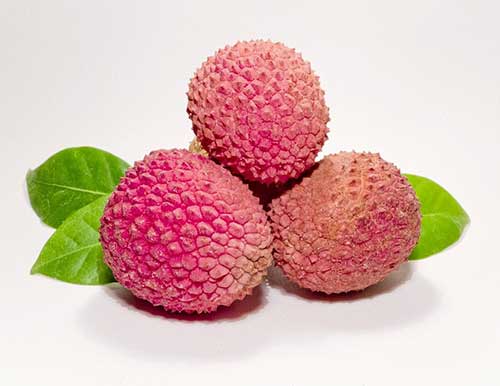
Now, this is a welcome relief considering that lychees contain as much as 16% carbohydrates, and carbs are associated with weight gain. While that’s normally true, lychees offer an equalizer in the form of insoluble fibers.
Remember that these fibers move through the cat’s stomach undigested. In the process, they carry with them much of the sugars in lychees, preventing these sugars from getting absorbed into the animal’s bloodstream.
4. Prevention of Disease
Like most fruits, lychees are loaded with antioxidants. Antioxidants are compounds that counteract the adverse effects of free radicals by preventing these molecules from inducing oxidative damage to body cells. This intricate mechanism may help to lower the incidences of disease.
Here are a few antioxidants in lychees, along with the role of each compound;
Epicatechin – This flavonoid is noted for its ability to improve heart health while also reducing the risks of diabetes and cancer.
Rutin – Rutin may also guard against chronic diseases, such as diabetes, cancer, and heart disease.
The following are other powerful nutritional elements in lychees, along with their potential health benefits for cats;
a. Vitamin C
Also known as ascorbic acid, vitamin C is an essential nutrient required for the growth, development, and repair of tissues and muscles.
Vitamin C is involved in numerous body functions, including the formation of collagen, the absorption of iron, and wound healing. It also has some antioxidant properties.
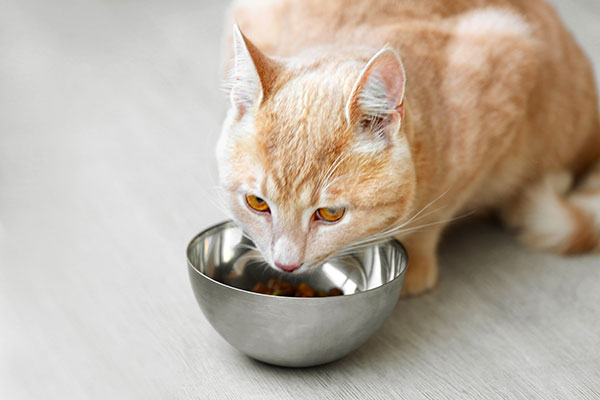
b. Calcium
Calcium is required for the growth and maintenance of strong bones and teeth. More than 95% of the calcium in your cat’s body occurs in his bones and teeth.
Calcium may also aid communication between your cat’s central nervous system and the rest of the body. Fortunately, the mineral is fairly abundant in lychees.
As a cat fancier who also happens to be a lychee lover, one of the common questions you’ll find yourself asking is – can old cats eat lychee?
Old cats can benefit from lychees in the same manner as their young and middle-aged counterparts. The high calcium content in lychees might help to strengthen your aging feline’s bones and teeth.
c. Copper
Although it mostly occurs in trace amounts, copper is an important mineral in various body processes.
Copper plays a role in aiding the synthesis of red blood cells as well as in maintaining the nerve cells and the immune system.
d. Potassium
The relatively high potassium content in lychees might help regulate your cat’s fluid balance. The mineral is also involved in muscle contraction and nerve signaling.
Potassium plays a pivotal role in managing blood pressure and reducing water retention. That makes it especially beneficial for cats with heart disease and kidney complications, respectively.
What’s more, potassium works in conjunction with calcium to strengthen bones, thereby preventing degenerative bone diseases like feline osteoarthritis.
Perhaps you’ve always wondered, can sick cats eat lychee?
Sick cats can definitely benefit from lychees. That’s especially true for cats with heart or kidney disease. As we’ve just seen, the high potassium content in lychees might help manage blood pressure for cats with heart problems and reduce water retention for those with kidney complications.
- SmartBlend of high-quality ingredients in the digestive care cat food starts with real salmon along with accents of carrots and...
- High levels of protein in Purina ONE Tender Selects Blend adult dry cat food with salmon help support your cat's strong muscles,...
- Is Purina ONE good for cats? This natural dry cat food with added vitamins, minerals and nutrients and no artificial flavors or...
Last update on 2024-07-23 / Affiliate links / Images from Amazon Product Advertising API
Is Lychee Good For Cats?
Having gone through some of the health benefits of lychees for cats, it’s intuitive to conclude that these fruits are perfectly safe for cats.
Indeed, lychees are packed with minerals, vitamins, and antioxidants that cats can benefit from. The fruits are also incredibly low in fat, which makes them all the more suitable for cats.
But as you may already know, every food has its advantages and downsides. That’s particularly true for plant-based foods for cats.
While your cat won’t possibly drop dead from consuming lychees, it would help to familiarize yourself with all the side effects to watch out for.
Potential Dangers of Lychees for Cats
Gastrointestinal complications are the most common side effects of lychees for cats. That’s because cats are inherently obligate carnivores. Evolution hasn’t prepared them for plant-based diets. Common gastrointestinal symptoms to expect include nausea and vomiting, diarrhea, and signs of abdominal discomfort.
The severity of these symptoms will largely depend on the amount of lychee that your cat has consumed and whether it’s his first time snacking on this fruit.
Besides inducing GI complications in cats, lychees may also trigger a raft of hypersensitive reactions. Again, these reactions will depend on the portions of lychee that your feline friend has downed and whether he’s only now getting introduced to the fruit.
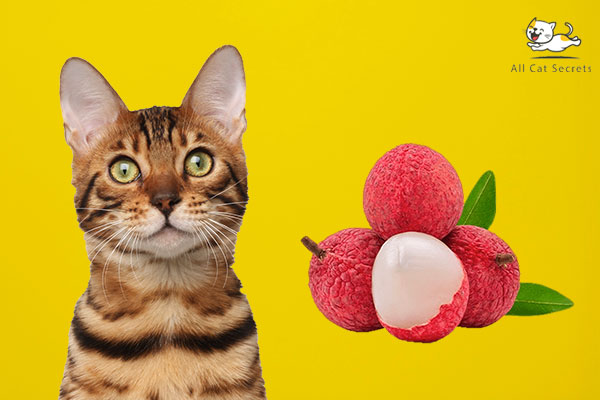
Lychee allergy in cats could present a wide spectrum of symptoms, including digestive issues like vomiting and diarrhea, respiratory problems like labored breathing, runny eyes and/or nose, irritability, itching, etc.
Last but not least, lychees contain the toxin hypoglycin. This toxin has been linked to brain inflammation in humans. Therefore, it’s logical to hypothesize that cats could also suffer the same fate. The saving grace, however, is that it will take a substantial amount of lychee served over a fairly long duration for these fruits to turn toxic.
If fed in moderation, lychees shouldn’t be problematic at all.
Is Lychee Fruit Bad For Cats?
Based on the potential side effects of lychees for cats that we’ve just highlighted, you could now be wondering, are lychees toxic to cats?
Yes, lychees may prove toxic to cats if fed in excess. Lychee toxicity in cats probably comes from the compound hypoglycin.
However, reports of lychee toxicity in cats are almost unheard of. Even the numerous human cases of brain inflammation attributed to lychees haven’t been conclusively proven. So far, it’s all a matter of hypothesis.
But it should be noted that any food could prove disastrous if fed to cats in excess. And the situation can only get worse if the food in question is plant-based, such as lychees.
Now that lychees could present some genuine risks to cats, you may now be wondering, can lychee fruit kill cats?
Your cat will unlikely drop dead from eating lychees. However, the side effects emanating from overexposure to lychees could eventually kill the animal if you do not seek urgent medical intervention.
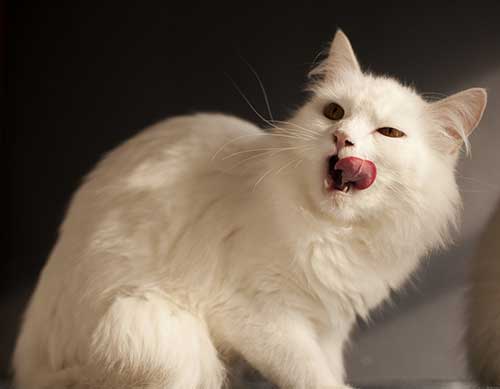
Are All Lychee Parts Safe For Cats?
Another fundamental question to settle, as far as cats and lychees are concerned, is whether your feline friend can snack on any lychee part.
Can Cats Eat Lychee Skin?
Cats shouldn’t eat lychee skin. That’s because lychee skin is a bit tougher than the flesh. Therefore, it might present choking hazards.
Besides, lychee skin has an unsavory taste. You don’t want your feline friend to be turned off the moment he tastes this nutritious fruit. Last but not least, lychee skin is less nutritious than the flesh.
In the same breath, you could be wondering, can cats eat unripe lychee?
Cats shouldn’t eat unripe lychees for the same reasons they shouldn’t eat lychee skin. Not only is unripe lichee bitter. It’s also less abundant in the mineral elements found in ripe lychee. Most importantly, unripe lychee could choke your cat.
- Tender high protein adult cat food complement made with real, hand-selected tuna, shrimp and whitefish in a silky, decadent broth...
- High-quality gourmet broth adult cat food topper intended as a complement to her complete and balanced diet
- Tuna, whitefish and shrimp adult cat food mixer is part of the complete line of Purina Fancy Feast gourmet wet and dry cat food...
Last update on 2024-07-23 / Affiliate links / Images from Amazon Product Advertising API
Can Cats Eat Lychee Seeds?
Lychee seeds are high in methylenecyclopropylglycine (MCPG), a homologue of the toxin hypoglycin A. Animal studies have linked hypoglycin A to hypoglycemia.
Lychee seeds can also present choking risks. Plus, the seeds could trigger stomach upset due to their indigestibility.
So, cats should not eat lychee seeds.
What if my cat accidentally eats a lychee seed?
If you suspect that your cat has accidentally consumed lychee seed, the first thing to do is establish the quantity of lychee the animal has consumed. That will help you to predict the nature and severity of side effects.
If you establish that the animal has consumed worrying amounts of lychee, the best course of action is to take him for a professional checkup.
Can Cats Eat Lychee Pits?
Lychee pits are pretty much the same as lychee seeds. Therefore, they are just as hazardous to cats as lychee seeds.
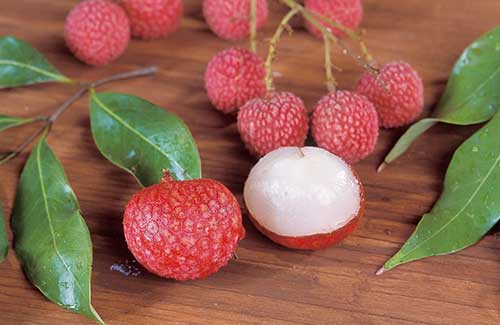
Can Cats Eat Lychee Nuts?
Lychees can be termed fruits when viewed in terms of their succulent flesh. However, they could also be considered nuts if viewed in terms of the pit and seeds.
While lychee flesh is safe and beneficial to cats, lychee nuts can be harmful and toxic.
It’s also worth noting that, like most foods, lychees come in various forms.
Can Cats Eat Lychee Jelly?
Cats can eat pure lychee jelly. Cats can also consume processed lychee jelly provided that the product isn’t laced with ingredients known to be toxic to cats, such as brine and spices.
Can You Feed Your Cat Canned Lychee?
Much like lychee jelly, the safety of canned lychee for cats depends on the other ingredients in the product.
Like you would with any store-bought canned food, avoid giving your cat canned lychees processed using too much salt and spices.
How Much Lychee Fruit Can Cats Eat?
There’s no standard principle on the amount of lychee to feed your cat. That will depend on factors like the animal’s age, body weight, and general health condition.
Obviously, older cats can safely consume larger amounts of lychee than kittens. The same logic applies to larger cat breeds and cats in perfect health conditions.
However, the conventional wisdom is to follow the rule of moderation. Whether your cat is eating lychees for the first time or not, always endeavor to keep the portions low. An overdose could trigger a host of adverse effects.
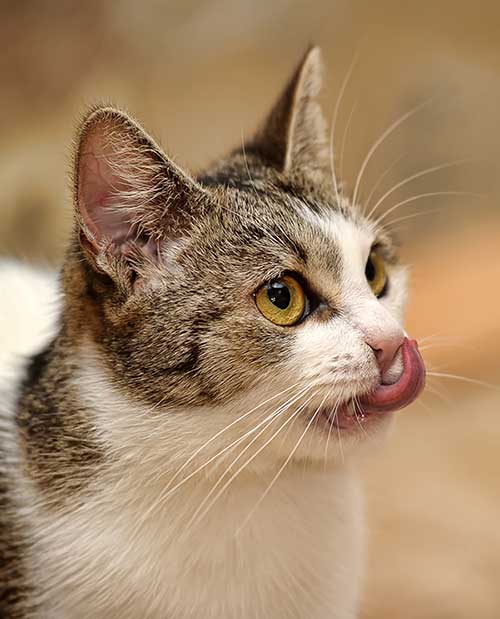
How to Prepare Lychee Fruit for Your Cat
When it comes to feeding fruits and vegetables to cats, there’s always the dilemma of serving these foods raw or cooked. Fortunately, cats can eat lychees raw or cooked. You only need to prepare the fruit safely to avoid any potential side effects.
When planning to feed raw lychee to cats, the first thing to do is go for ripe fruits. Next, peel off the skin to expose the soft, sweet flesh. It’s also recommended to remove any lychee seeds or pits as these could choke your feline friend. Lastly, wash the lychee flesh with clean water and cut it into smaller portions, and then serve it to your cat in moderation.
If you opt for cooked lychee, you’d also need to find a ripe fruit, peel it, and remove the seeds. Then, boil or steam the fruit over moderate heat, taking care not to add any salts, spices, or fats.
Other Frequently Asked Questions About Cats and Lychees
Can Kittens Eat Lychee?
Kittens have a more sensitive stomach than mature cats. So, if lychees are safe for cats in moderation, then it goes that kittens should consume even smaller amounts of these fruits. Most importantly, you should only offer lychees to kittens who’ve already been weaned.
Can Pregnant Cats Eat Lychee?
Pregnant cats can benefit from several nutrients in lychees. However, by virtue of their suppressed immunity, pregnant cats should consume lychee in minimal amounts. Any side effects from these fruits could prove disastrous for them and their unborn litter.
Can Nursing Cats Eat Lychee?
Nursing cats can benefit from lychees the same way pregnant cats would. Just remember to observe the rule of moderation.
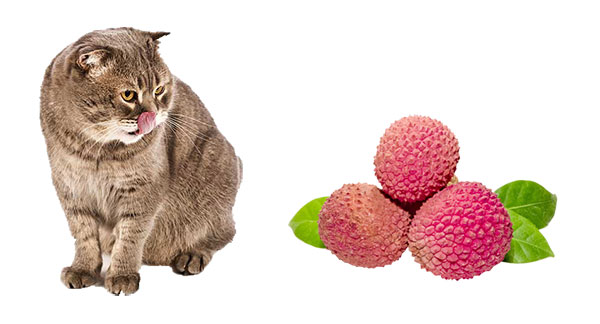
Conclusion
Lychees are considered among the many fruits that cats can eat. But as with any plant-based foods, lychees are only safe and beneficial for cats if offered occasionally and in moderation.
Checkout Our Favorite Cat Products
1. Best Online Course For Cat Parents
Our favorite: The Cat Language Bible (How to Finally Understand And Speak to Your Cat) – A new form of cat to human communication that many cat owners have dreamed about… but few have actually thought possible.
2. Best Immune Support For Cats
Our favorite: Tomlyn Immune Support – Best Supplement for Cats and Kittens.
3. Best Cat Treats
Our favorites: LIFE ESSENTIALS All Natural Freeze Dried Chicken And Sheba Meaty Tender Sticks – Both are Great.

